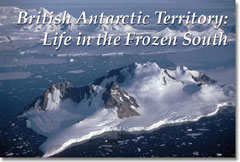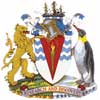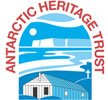|
British Antarctic Territory: Life in the Frozen South
This Territory consists of all the land, including the Antarctic Peninsula, and the Southern Ocean, south of 60° south between 20° and 80° west, an area of 1,709,400 km2. Although the UK claim overlaps with those of Argentina and Chile, the Antarctic Treaty provides an internationally agreed regime for the area, recognising its importance as an area for peace and science.
 There is no permanent population but the British Antarctic Survey have two year-round and one summer-only research stations here. Many other countries also have research stations in this region. The Southern Ocean offers unique opportunities for understanding evolution in marine systems. There is no permanent population but the British Antarctic Survey have two year-round and one summer-only research stations here. Many other countries also have research stations in this region. The Southern Ocean offers unique opportunities for understanding evolution in marine systems.
 The Protocol for the Protection of the Antarctic Environment, enacted as the Antarctic Act 1994, provides a licensing regime for all activities in the Territory by British nationals. This legislation also covers environmental monitoring and impact assessment, waste management, oil spills and protected areas and species. Management of commercial fishing is by international agreement through the Convention for the Conservation of Antarctic Marine Living Resources (CCAMLR).
The Protocol for the Protection of the Antarctic Environment, enacted as the Antarctic Act 1994, provides a licensing regime for all activities in the Territory by British nationals. This legislation also covers environmental monitoring and impact assessment, waste management, oil spills and protected areas and species. Management of commercial fishing is by international agreement through the Convention for the Conservation of Antarctic Marine Living Resources (CCAMLR).
 Annual meetings of the Treaty and CCAMLR provide a forum for monitoring environmental activities and fishing. Major current issues include management of increasing tourism, proposals for the southern ocean whale sanctuary and climate change. Annual meetings of the Treaty and CCAMLR provide a forum for monitoring environmental activities and fishing. Major current issues include management of increasing tourism, proposals for the southern ocean whale sanctuary and climate change.
|
 |
 |
 |
| click images for larger versions |
| On land, although vegetation is sparse, there are many types of lichen, moss and algae. In the surrounding seas, vast amounts of krill (pictured) provide the basis for rich marine life. This includes whales, seals and very large numbers of birds especially petrels and penguins, inhabiting the islands and coastal areas of the Peninsula. Adélie (pictured) and emperor penguins both breed on the continent itself. |
| Photographs courtesy of Pete Bucktrout, Chris Gilbert (BAS); Michael Gore FRPS |
|
 |
|
|
|
















